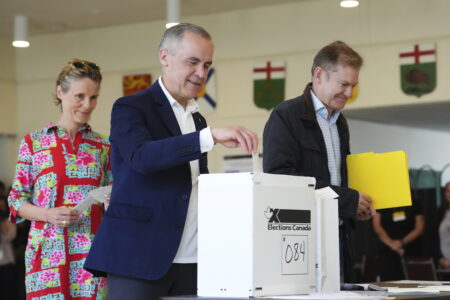Morrisey weighing decisions on unsigned bills

Gov. Patrick Morrisey signs Senate Bill 199, relating to elementary behavior intervention and safety, in a ceremony with fifth graders at Ripley Elementary School earlier in April. (File Photo)
CHARLESTON — Gov. Patrick Morrisey has until Wednesday to decide whether to sign the remaining bills on his desk passed by the West Virginia Legislature during its 60-day regular session, veto those bills, or let those bills become law without his signature. According to a social media post Sunday night, Morrisey said he is still considering as many as 40 remaining bills out of the 249 bills passed by lawmakers between Feb. 12 and April 12. “After many days of reviewing bills, we are near the end of the review process,” Morrisey said. “The final 40 bills are under close review, as we continue to research them and see whether there are adequate arguments to approve these bills to determine whether they should become law.” When the Legislature is in session, the governor has five days – excluding Sundays – to decide whether to sign or veto a bill once it arrives at his desk once a bill is reviewed by the Senate and House Clerk’s offices. A governor also has the option to allow a bill to become law without their signature. But when the Legislature adjourns sine die, the governor has 15 days to sign or veto bills – excluding Sunday – or allow the bill to become law without their signature. Regardless of when the legislature is in session or not, the governor has a five-day deadline to sign the budget bills or supplemental appropriations bills. The 2025 regular session ended with 249 bills passed by the Legislature. As of Monday morning, Morrisey signed 84 of those bills according to the Legislature’s website. According to Morrisey’s social media post, he has signed 161 bills, though some of those bills have not been filed yet with the Legislature, with another 48 bills approved and awaiting his signature and filing with the Legislature. Morrisey has held bill signing ceremonies several times over the last several weeks. One of the first bills signed by Morrisey in a ceremony in a packed Governor’s Reception Room was Senate Bill 456, the Riley Gaines Act defining the terms “male” and “female” in State Code and protecting single-sex spaces. Following the signing on March 24 of House Bill 2354, banning certain products from food in West Virginia, Morrisey held a press event in Martinsburg with U.S. Department of Health and Human Services Secretary Robert F. Kennedy Jr. HB 2354 bans specific food additives and dyes found in processed food products sold in the state — such as Red Dye No. 3 and Yellow Dye No. 5 — beginning Jan. 1, 2028; and from school food by August. Morrisey has also held bill signing ceremonies for Senate Bill 458, the Universal Professional and Occupational Licensing Act; Senate Bill 199, relating to elementary behavior intervention and safety; Senate Bill 196, Lauren’s Law that increase penalties for certain drug-related crimes involving fentanyl; and House Bill 2067, House Bill 3342, and Senate Bill 270, providing additional protections for firearms owners. Several of the remaining bills include legislation introduced on behalf of the governor. These include House Bill 2002, creating a one-stop permitting process for infrastructure and energy projects; House Bill 2003, prohibiting cell phones in K-12 schools; House bills 2008, 2009, and 2013, consolidating several state departments and ending civil service/grievance procedures for new or promoted state employees; and House Bill 2014, creating a program aimed at attracting data centers and the use of microgrids. To date, Morrisey has only vetoed one bill: a rules bundle dealing with several elections-related rules promulgated by the State Election Commission. But the Legislature quickly fixed the technical issues with the bill raised by Morrisey and the bill was approved. Morrisey also used his line-item veto 29 times on House Bill 2026, the budget bill setting the general revenue budget for fiscal year 2026 beginning July 1. Morrisey’s line-item vetoes reduced state spending by approximately $37.7 million, bringing the total general revenue budget down to $5.280 billion. That leaves approximately $42 million of unappropriated monies in the fiscal year 2026 general revenue budget. The governor also used his line-item veto to reduce the spending of surplus tax collections in the fiscal year 2026 general revenue budget that would be available at the end of the current fiscal year on June 30, reducing that potential expenditure from approximately $210 million to $100 million, which will go to the Division of Highways for paving and maintenance if surplus is available at the end of the current fiscal year. In several statements over the last two weeks, Morrisey has alluded to additional challenges that could face the state budget in fiscal year 2026, including possible changes to the federal Medicaid program, increased health care costs for the state Public Employees Insurance Agency (PEIA), and other changes in state funding from federal reforms. Morrisey said the remaining bills on his desk will be reviewed based on whether they provide additional costs to the state. “For the future, folks should know that if your bill costs taxpayers money and you haven’t provided an offset (a saver) for your proposed program, the odds of your initiative getting approved will be slim,” Morrisey said on X. “We work for the taxpayers and should never forget that fact!! Taxpayers must be respected!!!” Steven Allen Adams can be reached at sadams@newsandsentinel.com





